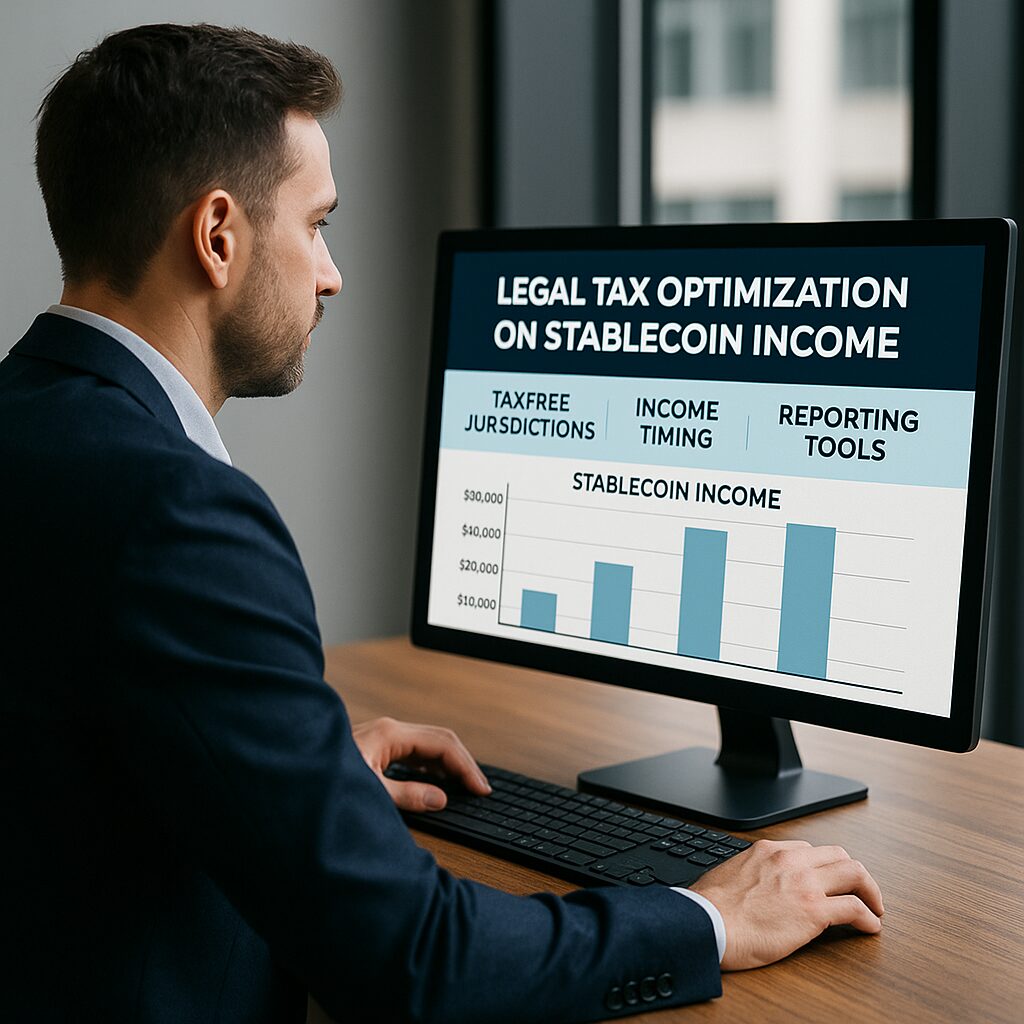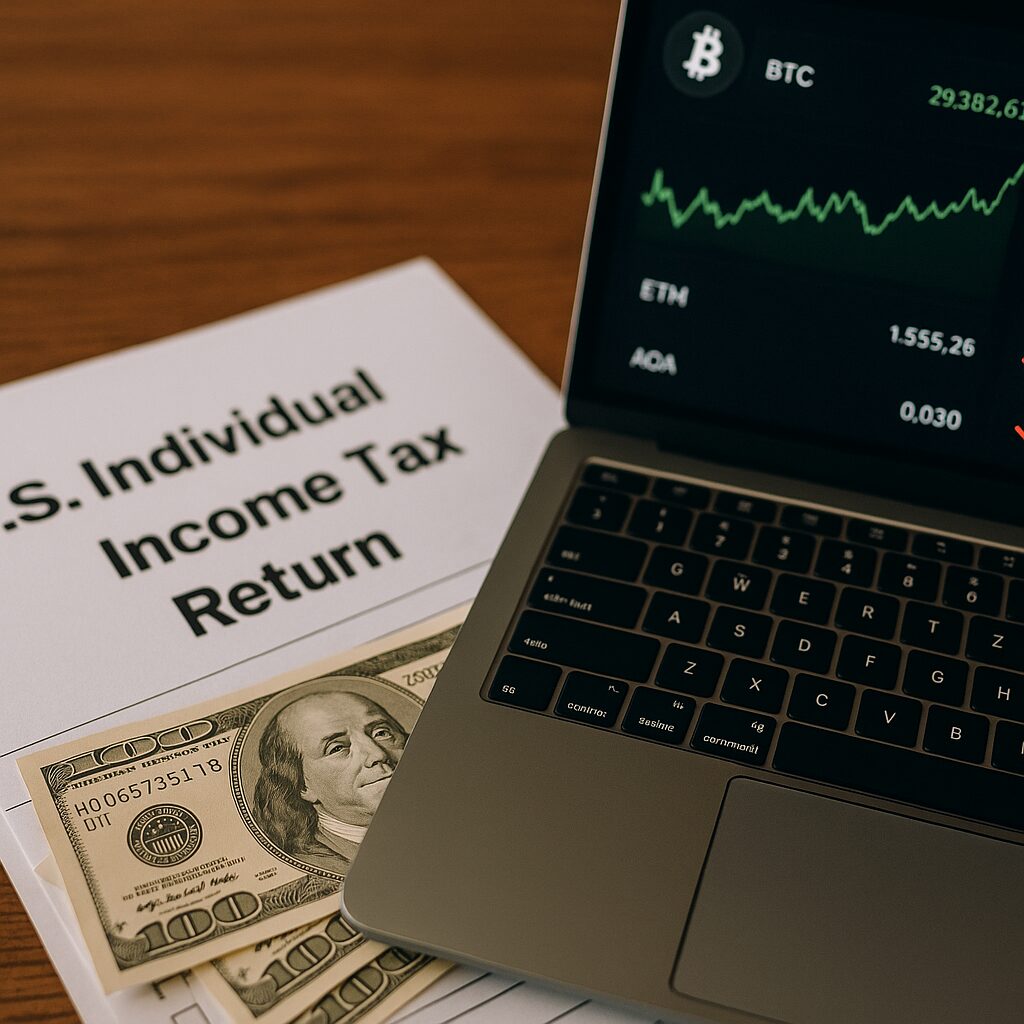Stablecoins have become a cornerstone of digital finance — used for saving, lending, trading, and earning yield. But while the interest income may appear simple, its tax implications are anything but.
Whether you’re staking USDC, lending on DeFi platforms, or earning yield from tokenized assets, your income is often taxable. The good news? There are legal ways to minimize your tax burden, stay compliant, and retain more of your digital earnings.
This article will guide you through global tax strategies to optimize your stablecoin income legally and efficiently.
1. Is Stablecoin Income Taxable?
In most jurisdictions, yes — stablecoin yield is treated as ordinary income.
Common taxable events:
- Interest from CeFi or DeFi platforms
- Staking rewards paid in stablecoins
- Airdrops or liquidity incentives in stablecoins
- Auto-compounded stablecoin vaults
Even if you don’t convert to fiat, stablecoin yield is taxable at the moment of receipt, in most countries.
2. Key Tax Classifications by Country
| Country | Stablecoin Income Treatment | Notes |
|---|---|---|
| 🇺🇸 USA | Ordinary income, taxed on receipt | Must report in USD at fair market value |
| 🇩🇪 Germany | Taxable as income if held <1 year | Long-term holding benefits apply |
| 🇦🇺 Australia | Taxed under capital gains rules | CGT discount possible if held >1 yr |
| 🇬🇧 UK | Taxable as miscellaneous income | Reporting via HMRC SA100 |
| 🇸🇬 Singapore | Currently tax-free (personal) | Subject to change |
| 🇦🇪 UAE | Tax-free for individuals | No capital gains tax on crypto |
Local regulations may vary and evolve — consult a licensed advisor for your residency.
3. Common Mistakes That Trigger Tax Trouble
- Not tracking stablecoin yield across multiple platforms
- Assuming stablecoins are non-taxable (they are treated like fiat in many cases)
- Missing timestamps and prices at time of income
- No cost basis tracking, especially for rewards reinvested
Solution? Use tools like:
- Koinly
- Accointing
- CoinTracker
- CryptoTaxCalculator
These platforms automate CSV import, wallet sync, income labeling, and tax report generation.
4. Legal Tax Optimization Strategies
a. Use Tax-Free Jurisdictions (if eligible)
- Reside in crypto-friendly regions like Singapore, Portugal, or UAE
- Some regions offer 0% capital gains and income tax on crypto earnings
b. Use Stablecoin Vaults with Long-Term Holding
- Some jurisdictions tax income only if stablecoins are withdrawn or sold
- Use vaults that auto-compound internally, delaying tax events
c. Time Your Income Events
- Postpone harvesting yield until the next fiscal year
- Withdraw interest strategically to stay under tax thresholds
d. Utilize Offshore Corporate Structures
- Advanced strategy for high-net-worth investors
- Set up licensed entities in crypto-friendly jurisdictions
- Must ensure compliance with international tax reporting rules (FATCA, CRS)
5. How Stablecoin Type Affects Tax Reporting
Not all stablecoins are treated equally in legal terms:
| Stablecoin | Tax Complexity | Notes |
|---|---|---|
| USDC | Low | Fully backed, easy to audit |
| USDT | Medium | Sometimes questioned by regulators |
| DAI | Medium | Partially decentralized, algorithmic |
| GUSD/PAX | Low | Regulated, clear compliance reporting |
Regulators prefer transparency — using highly regulated stablecoins can ease audit processes.
6. Tools to Automate and Stay Compliant
a. Koinly
- Supports hundreds of wallets and exchanges
- Custom income tags, DeFi compatible
b. CoinTracking.info
- Powerful reporting tools
- International tax form generation
c. CryptoTaxCalculator
- Best for Australian and UK users
- NFT and staking support included
d. TaxBit (U.S. focus)
- IRS-compliant reports
- Partnership with major exchanges
Using one of these tools can reduce tax filing time from weeks to minutes.
7. Case Study: $50,000 in Stablecoin Income
Let’s say you earned $50,000 in stablecoin yield across 3 platforms. Without optimization, you could owe:
- 🇺🇸 USA: $15,000+ in federal taxes
- 🇬🇧 UK: ~20–30% depending on bracket
- 🇸🇬 Singapore: $0 (if qualified as personal investment)
- 🇩🇪 Germany: Full tax if sold in under 1 year
Now, with basic strategies:
- Deferring yield realization
- Using tokenized vaults
- Reporting in tax-free jurisdictions
…you could legally reduce that burden by 30–100%, depending on your situation.
Conclusion
Stablecoin income may seem simple — but taxation is not. By proactively using legal strategies, tracking tools, and international tax frameworks, you can retain more of your earnings while staying fully compliant.
In the age of digital income, legal tax minimization is just as powerful as yield maximization.
📌 Coming Up Next
Top Platforms to Earn Real Yield from Tokenized Government and Corporate Bonds
→ In our next article, we’ll explore how to earn stable, real-world yield through tokenized fixed-income products — from treasury tokens to corporate debt instruments.

